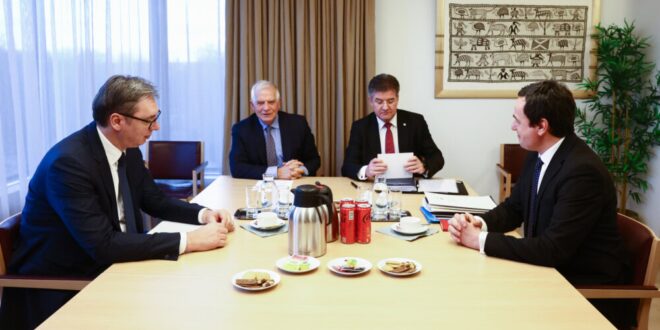The text of the European Union’s proposal for an Agreement on the path to the normalization of relations between Kosovo and Serbia was published on the website of the European External Affairs Service (EEAS) .
According to the words of the high representative of the EU for foreign policy and security, Josep Borrell, the President of Serbia, Aleksandar Vučić, and the Prime Minister of Kosovo, Aljbin Kurti, agreed with the confused proposal in Brussels.
It is about an almost identical document published by Danas on January 22 of this year .
The text of the European proposal is transmitted in its entirety:
Contracting Parties,
Aware of its responsibility to preserve peace,
Committed to contributing to fruitful regional cooperation and security in Europe and overcoming the legacy of the past,
Aware that the inviolability of borders and respect for territorial integrity and sovereignty and the protection of national minorities are the basic conditions for peace,
Starting from historical facts and without questioning the different views of the parties on fundamental issues, including status issues,
In the desire to create conditions for cooperation between the parties for the benefit of the people,
They agreed on the following:
Article 1
The parties will mutually develop normal, good-neighborly relations based on equal rights.
Both parties will mutually recognize their documents and national symbols, including passports, diplomas, license plates and customs stamps.
Article 2
Both sides will be guided by the goals and principles set forth in the United Nations Charter, especially the sovereign equality of all states, respect for their independence, autonomy and territorial integrity, the right to self-determination, protection of human rights and non-discrimination.
Article 3
In accordance with the Charter of the United Nations, the parties shall settle all disputes between themselves exclusively by peaceful means and shall refrain from the threat or use of force.
Article 4
The parties start from the assumption that none of them can represent the other in the international sphere or act on its behalf.
Serbia will not oppose Kosovo’s membership in any international organization.
Article 5
Neither party will block, nor encourage others to block, the other party’s progress on their path to the EU on their own merits. Both parties will respect the values stated in Articles 2 and 21 of the Treaty on European Union.
Article 6
Although the current agreement represents an important step in normalization, both sides will continue the dialogue process led by the EU with new momentum, which should lead to a legally binding agreement on the comprehensive normalization of their relations.
The parties agree to deepen future cooperation in the fields of economy, science and technology, traffic and connectivity, judicial and police relations, post and telecommunications, health, culture, religion, sports, environmental protection, missing, displaced persons and other similar areas by concluding specific agreements.
Details will be agreed in additional agreements in the EU-sponsored dialogue.
Article 7
Both parties undertake to establish special arrangements and guarantees, in accordance with the relevant instruments of the Council of Europe and relying on existing European experiences, in order to ensure an appropriate level of self-governance for the Serbian community in Kosovo and the ability to provide services in certain areas, including the possibility financial support from Serbia and a direct channel of communication between the Serbian community and the Government of Kosovo.
The parties will formalize the status of the Serbian Orthodox Church in Kosovo and provide a strong level of protection to Serbian religious and cultural heritage sites, in line with existing European models.
Article 8
The parties will exchange permanent missions. They are established in the seat of the respective Government.
Practical issues related to the establishment of missions will be dealt with separately.
Article 9
Both sides take into account the commitment of the EU and other donors to establish a special package of investments and financial support for joint projects of the parties in economic development, connectivity, green transition and other key areas.
Article 10
The parties will establish a joint committee, chaired by the EU, to monitor the implementation of this agreement.
Both parties confirm their obligation to implement all previous agreements in the dialogue, which remain valid and binding.
Article 11
Both parties undertake to comply with the Implementation Roadmap attached to this Agreement.
 Eurasia Press & News
Eurasia Press & News




